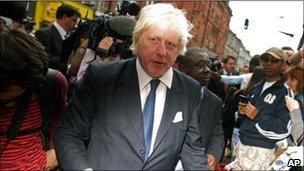Riots: Boris Johnson and PM at odds over police cuts
- Published

Mr Johnson met angry residents and business people in south London on Tuesday
Mayor of London Boris Johnson has said police budgets should not be cut, after days of looting and disorder.
He told BBC Radio 4's Today: "This is not a time to think about making substantial cuts in police numbers."
It puts the Tory mayor at odds with ministers who say police budgets can be cut without hitting the front line.
Prime Minister David Cameron said he did not blame Mr Johnson for wanting more money but said there would be no reduction in "visible policing".
Downing Street has said the violence would not change police funding plans - but London Labour MPs are demanding a "moratorium" on police cuts in the city.
The government's emergency committee Cobra met again in Downing Street on Wednesday - chaired by the prime minister - after a night in which police faced violence in Manchester and Salford, with fire bombs thrown at shops and looting.
'Robust policing'
Birmingham, Nottingham and Liverpool also saw significant disturbances but London was relatively calm after police officers on the streets were increased from 6,000 to 16,000, many of them drafted in from other forces. It followed three successive nights of violence across the city.
Speaking ahead of the Cobra meeting, Mr Johnson said "robust policing" was needed and, with the Olympics being held in London next year, people had to be "absolutely confident in our policing".
He told the BBC: "If you ask me if I think there is a case for cutting police budgets in light of these events then my answer to that would be no - I think that case was always pretty frail and it has been substantially weakened.
"This is not a time to think about making substantial cuts in police numbers."
Asked if he was opposed to the government's budget cuts to the police - he said people were always trying to find divisions between him and the government, but added: "Even though we've been able to boost numbers in London, I think it would be a good thing if the government had another look."
But Mr Cameron told reporters: "Mayors, local authorities always want more money and I don't blame them for that. It's the government's job to give them what they need and to make sure they make the most of what they get."
He said the first question to police at the Cobra meeting was whether they had the resources needed "and the answer was yes they did". He said police numbers on the streets had been increased in the past few days - showing it "can be done".
The prime minister added: "We won't do anything that will reduce the amount of visible policing on our streets. The last 48 hours has actually demonstrated how we can get a lot out of what we currently have, visible policing. We won't do anything that puts public safety at risk."
The Home Office said reductions in the police budget for the spending review period were "manageable" and police would still have enough officers "to deploy in the kind of numbers we've seen in the past couple of days" after the cuts were over.
Mr Johnson's predecessor as London mayor - and Labour rival for the next term - Ken Livingstone said: "I was able to increase police numbers by 7,000 in my eight years as mayor, I didn't ask the government's permission, I asked the commissioner of police how many police do you need to cope with problems in London?"
He said: "All this year officers in the Met have been warning the mayor and the government there is a real danger of civil disturbance on our streets, and they failed to act."
A group of London Labour MPs, including the party's deputy leader Harriet Harman, are meeting Home Office minister James Brokenshire over police budgets. Ms Harman said: "They must promise today that they will not carry on with the cuts."
The government is cutting budgets across the public sector as part of its plan to eliminate the UK's structural budget deficit by 2015-16 - a policy it argues is necessary to ensure market confidence in the UK and keep it out of the "danger zone".
The police watchdog, Her Majesty's Inspectorate of Constabulary, said in a report last month, external that information from police forces in England and Wales suggested the number of police officers would be reduced by 16,200 between March 2010 and March 2015 - and police staff overall would fall by 34,100.
Meanwhile the Fire Brigades Union has expressed anger that politicians have not mentioned cuts to the fire service - which has also been busy as vandals have set fire to shops and cars. In London alone firefighters faced thousands of calls - but the FBU said no-one had challenged budget cuts to the service.
The union's assistant general secretary Andy Dark said: "We're over-stretched and struggling now when we have to deal with a whole range of major incidents. We'll be at breaking point when the cuts really bite over the next two years."
MPs will return to Parliament on Thursday to debate the violence of the past few days. Trouble initially broke out in Tottenham, north London, where 29-year-old Mark Duggan was shot dead by police last week.